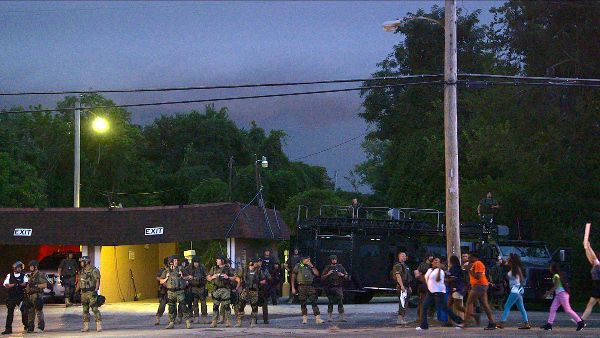Eye For Film >> Movies >> Do Not Resist (2016) Film Review
Do Not Resist
Reviewed by: Jennie Kermode

Over the past two decades there has been a striking increase in the use of military hardware and military tactics by US police on home soil, with military attitudes following suit. This development has been attended by a number of documentaries. Whilst not quite up there with the finest of these, Do Not Resist does a good job of summing up recent events and looking at the philosophies that have fed into them.
A mixture of archive footage and interviews, the film makes its points through observation rather than narration, which means that viewers will already need to be alert to the issues in order to extract salient information from it. On the other hand, the absence of preaching is welcome, and it would be difficult to miss the way major factors like race and class intersect with the subject as we see who is discussing it in meeting rooms and who is joining the gatherings in the streets. The presence of ordinary officers talking about their mixed feelings as they manage angry crowds provides balance for the more passionately expressed concerns of those opposed to militarisation.
Although the film is strong in communicating the ideas at play, it's relatively thin on explaining the practicalities and the economic factors that have led to large quantities of military hardware ending up in the hands of police departments. Psychological issues are also largely overlooked. The emphasis is on topicality but the absence of historical context around protests over police killings of African Americans gives undue weight to the notion that events are escalating toward some unprecedented extreme conflict. It's in the more mundane sequences that the film tightens its grip. The normalisation of the politics of fear is deftly conveyed through insights into police training and public discourse which also serve to illustrate some of the financial incentives involved in it.
There's a particularly chilling passage towards the end of this film in which a criminal profiler, in all earnestness, describes a hypothetical group of prisoners as Darth Vaders and Luke Skywalkers, saying that if one doesn't know which is which then anybody with characteristics of the former must be locked up, whereas deciding that somebody s the latter requires much more compelling evidence. At a stroke, and apparently quite unwittingly, he obliterates the concept that in order to be condemned a defendant must be guilty beyond a shadow of a doubt. It's a moment that sums up the logic in display throughout much of he film and perhaps captures what it's trying to explicate. Like the rest, it passes without comment, leaving one wondering how many viewers will take it in - but perhaps the ease with which these things can be overlooked is part of the point the film is making.
Reviewed on: 05 Nov 2016
















